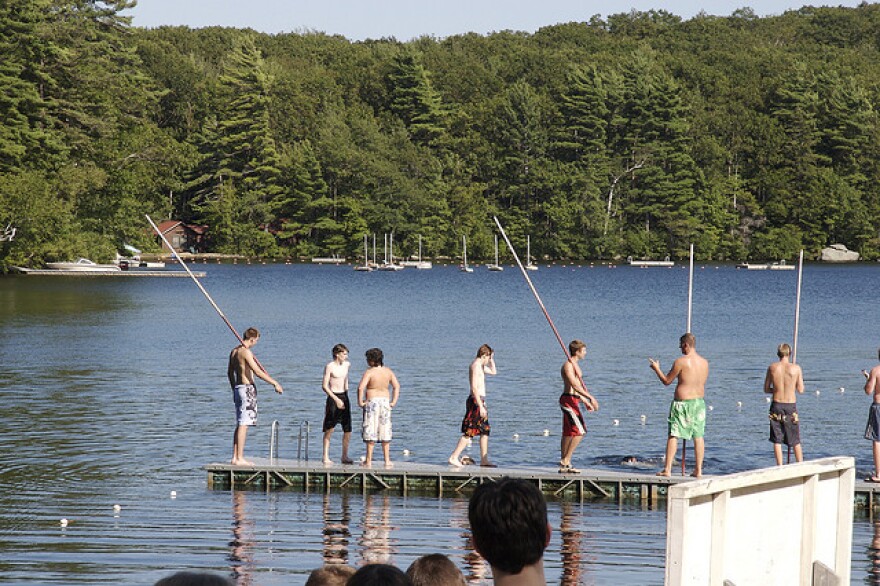Happy campers produce more than beaded wallets and macramé planters. They also generate millions in revenue, payroll and taxes.
At last count there were 289 youth summer camps in New Hampshire, contributing $317 million to the state’s economy and supporting 4,400 jobs with $128 million in total payroll, according to a 2011 report issued by the American Camps Association of New England.
Summer camps also attract 42,000 out-of-state visitors, who spend $5.9 million annually. And camps generate more than $39 million in state, local and federal taxes and fees.
While recent headlines bemoan the lack of summer employment opportunities for teenagers, summer camp jobs for high school and college students have risen. Between 2007 and 2010, total payroll by NH employers fell by 1 percent while the state’s youth camping industry rose by more than 3 percent.
And despite the increased competition for the attention of today’s kids—including the technology lure of iPads, smartphones and video games—summer camps continue to be popular.
“Our national organization just did an enrollment survey to camps and 76 percent of the camps surveyed reported enrollment was the same as last year or higher,” says Bette S. Bussel, Executive Director of American Camp Association, New England. “There are still camps that are filled [for the next season] as soon as camp is over.”

Bussel says summer camps in New England are doing well in part because of the long tradition of attending summer camp in the region.
“New England is the birthplace of camps,” Bussel says, noting the first summer camp started in Connecticut more than 100 years ago. “We still have camps where you have a grandparent, parent and a child that all went to the same camp.”
And New England camps draw campers from across the country, including President Obama’s daughters, who spent a month at a New Hampshire camp in 2012.
The dollars generated by summer camps are essential to local economies, as most are located in rural areas dependent on tourist spending. Camps also tend to hire local vendors, including electricians, carpenters and other trades people to prepare for the summer season.

“Camps are little economic engines in the communities that they are in. Camps often use local people for construction projects and supplies,” Bussel says. “They bring dollars for hotels, restaurants and gas stations.”
For the YMCA, camping is big business, with a total of six overnight camps and eight day camps in the state. Many of these camps have annual revenue exceeding $2 million, according to Guidestar.org, and each have hundreds of kids attending each week.
YMCA Camp Coniston, founded in 1911 in Croydon, has $2.4 million in annual revenue and 370 kids per each two-week overnight session. It also has loyal alumni-—more than 2,000 of them came to its centennial celebration in 2011.
'Family camp' is another huge economic engine in NH. The YMCA of Greater Boston has run Sandy Island Family Camp on an island on Lake Winnipesaukee since 1899. Today, families pay around $2,500 a week for one of 54 cabins, a slew of activities and communal meals.

But while summer camps of all types remain popular, they do face economic challenges. Chief among them is the school year has gotten longer, meaning there's a shorter summer camp season, especially when districts have to compensate for snow days.
Another problem is colleges starting fall semesters earlier, so college students working as camp counselors often can’t work the full summer season as they need to head back to school in August.
“It impacts the number of days you can manage to run,” Bette Bussel says, explaining many camps have cut their sessions from eight weeks to seven weeks in response.
In some cases, the increase in camp choices means parents are also waiting later to sign up children, making it difficult for camp directors to plan expenses and staffing needs. And then the are the rising costs of running summer camps, including food and transportation.
"Insurance is a big factor for camps,” Bussel adds, noting when there was an increase in abuse allegations years ago, insurance premiums skyrocketed.
“Running a camp used to be a secondary occupation. Now, you have to work all year round for your camp, even if it’s only running 10 weeks in the summer."
Despite these challenges, Bussel says people continue to want to provide their children with unique experiences, which is why camps endure.
“It's communicating the value of being removed from electronics and having a simpler life," she says.
And as long as that continues, the value of camps to New Hampshire, at least in terms of dollars, will endure as well.
This story was excerpted from Business NH Magazine. To read the full story, click here.






